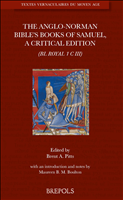The Anglo-Norman Bible's Books of Samuel : a critical edition (BL Royal 1 C III)
270 p.
Tales of treachery and friendship, adultery and murder, rape and revenge, as well as prophecy, repentance, forgiveness and thanksgiving - such is the stuff of the Anglo-Norman Bible's Books of Samuel. They recount the life of the last of Israel's judges but include some of the world's best-known characters - Saul, David and Jonathan, Goliath, Bathsheba, and Absalom. The first book traces the life of Samuel, and the initial success of King Saul, chosen to satisfy the Israelites' demand for a king. After Saul loses God's favour, David enters his court to console him, but Saul envies David's success. When Saul dies in battle, David succeeds him. In book two, David consolidates control over his kingdom, but his adultery with Bathsheba precipitates the reverses of the final chapters. Historically, the Books of Samuel trace the creation of Israel's monarchy and explain its ultimate failure. Religiously, they relate Israel's continuing relationship with God and the establishment of Jerusalem as the religious and
political capital of the new kingdom.Two mid-fourteenth-century manuscripts preserve the text of the Anglo-Norman Bible's Samuel. The base manuscript (L), British Library Royal 1 C III, notable for its inclusion of multi-lingual glosses, was acquired by Henry VIII from the Benedictine Abbey of Reading in 1530. The lavishly illustrated Paris, Bibliothèque nationale de France, MS français 1 (P), produced in England for the baronial de Welles family, later belonged to King Louis XII of France. Brent A. Pitts has prepared the critical edition and Maureen Boulton's introduction and notes elucidate the text and its interpretation by medieval commentators. [Publisher's text].
Special access authorizations may apply; please contact us for further information.


